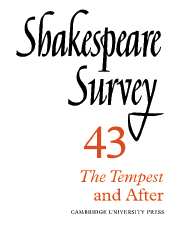Book contents
- Frontmatter
- The Power of Magic: From Endimion to The Tempest
- Reading The Tempest
- The Latter End of Prospero’s Commonwealth
- Henry VIII and the Deconstruction of History
- The Politics of Conscience in All is True (or Henry VIII)
- Shakespeare’s Romantic Innocents and the Misappropriation of the Romance Past: The Case of The Two Noble Kinsmen
- The Hand of John Fletcher in Double Falsehood
- ‘The Duke my Father’s Wrack’: The Innocence of the Restoration Tempest
- ‘Remember/First to Possess his Books’: The Appropriation of The Tempest 1700-1800
- The Tempest and After
- Poetry’s Sea-Changes: T. S. Eliot and The Tempest
- The New Function of Language in Shakespeare’s Pericles: Oath versus ‘Holy Word’
- The Discovery of The Rose Theatre: Some Implications
- The Origins of the Roxana and Messallina Illustrations
- Recycling the Early Histories: ‘The Wars of the Roses’ and ‘The Plantagenets’
- Shakespeare Production in England in 1989
- Professional Shakespeare Productions in the British Isles, January-December 1988
- The Year's Contributions to Shakespeare Studies: 1 Critical Studies
- 2 Shakespeare’s Life, Times, and Stage
- 3 Editions and Textual Studies
- Books Received
- Index
Professional Shakespeare Productions in the British Isles, January-December 1988
Published online by Cambridge University Press: 28 March 2007
- Frontmatter
- The Power of Magic: From Endimion to The Tempest
- Reading The Tempest
- The Latter End of Prospero’s Commonwealth
- Henry VIII and the Deconstruction of History
- The Politics of Conscience in All is True (or Henry VIII)
- Shakespeare’s Romantic Innocents and the Misappropriation of the Romance Past: The Case of The Two Noble Kinsmen
- The Hand of John Fletcher in Double Falsehood
- ‘The Duke my Father’s Wrack’: The Innocence of the Restoration Tempest
- ‘Remember/First to Possess his Books’: The Appropriation of The Tempest 1700-1800
- The Tempest and After
- Poetry’s Sea-Changes: T. S. Eliot and The Tempest
- The New Function of Language in Shakespeare’s Pericles: Oath versus ‘Holy Word’
- The Discovery of The Rose Theatre: Some Implications
- The Origins of the Roxana and Messallina Illustrations
- Recycling the Early Histories: ‘The Wars of the Roses’ and ‘The Plantagenets’
- Shakespeare Production in England in 1989
- Professional Shakespeare Productions in the British Isles, January-December 1988
- The Year's Contributions to Shakespeare Studies: 1 Critical Studies
- 2 Shakespeare’s Life, Times, and Stage
- 3 Editions and Textual Studies
- Books Received
- Index
Summary
Most of the productions listed are by professional companies, but some amateur productions and adaptations are included. Information is taken from programmes, supplemented by reviews, held in the Birmingham Shakespeare Library. Details have been verified wherever possible, but the nature of the material prevents corroboration in every case.
ALL'S WELL THAT ENDS WELL
Flying Colours Theatre Company, Pentameters Theatre Club, Hampstead: 21 Sept-16 Oct. 1988 Directors: Stewart Gray, Graham Mitchell Helena: Stephi Hemelryk
ANTONY AND CLEOPATRA
The National Theatre at the Olivier, London: 9 April 1987-6 Feb. 1988 See Shakespeare Survey 42, p. 149.
AS YOU LIKE IT
British Actors Touring Company, York Theatre Royal and tour: 1 Mar. 1988-
The company has no director
Rosalind: Kate O'Mara
Jaques: Patrick Marley
Royal Lyceum, Edinburgh: 28 Oct.-19 Nov. 1988
Director: Hamish Glen
Designer: Peter Ling
Rosalind: Siobhan Redmond
Prehistoric standing stones represented Arden.
Tartan costumes indicated a Scottish location.
Renaissance Theatre Company, Birmingham
Repertory Theatre Studio, Phoenix Theatre
London and tour: 8 April 1988—
Director: Geraldine McEwan
Designer: Jenny Tiramani
Rosalind: Tarn Hoskyns
Touchstone: Kenneth Branagh
See Shakespeare Survey 42, p. 130.
The Duke's Theatre, Lancaster. Promenade production in Williamson Park: 14 June—23 July 1988
Director: Jonathan Petherbridge
Designer: Eve Stewart
Music: Andy Whitfield
Rosalind: Tracie Gillman
- Type
- Chapter
- Information
- Shakespeare Survey , pp. 205 - 218Publisher: Cambridge University PressPrint publication year: 1991

